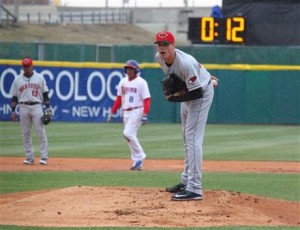BUFFALO, N.Y. (AP) — Minor league baseball’s new speed-up rules hit a glitch on opening day.
The center field clock in Buffalo stopped working after the second inning of the Triple-A Bisons’ opener against the Rochester Red Wings on Thursday. The game was the first on the regular-season minor league schedule, and first to debut pace-of-play rules introduced this offseason.
Pitchers have 2 minutes and 25 seconds to begin their windup or come to set between innings. And 20 seconds to do so between pitches.
Each pitch is supposed to be timed by three clocks in the stadium — two behind home plate and one beyond center field.
The clocks worked through two innings before the center field clock went out to start the third. It came back on at the start of the fourth inning. All three clocks then went out at the top of the sixth, then came back on for the bottom half of the inning.
International League President Randy Mobley told The Associated Press that there was a problem with the clocks’ communication system.
“It just hung up and we had to find a way to get that cleared and going again,” Mobley said. He said league officials have been reviewing the glitch with the Bisons. “We’ve got a little bit of learning to do on that yet.”
Mobley said it’s too early to determine whether the problem has been resolved or could re-occur.
“We would all like for it to go very, very smoothly,” Mobley said. “When we’re all said and done, and those are the only two (glitches) we’ve had, then we will have probably had a pretty good night.”
The new rules account for clock malfunctions. If they happen, umpires are supposed to keep time on a stopwatch while the stadium clocks are turned off.
Otherwise, both starting pitchers wasted no time in delivering their first pitches under a light drizzle.
Bisons starter Andrew Albers got his first pitch off with about 13 seconds left on the pitch clock to open the game. And Red Wings starter Alex Meyer was even quicker, getting his first pitch off with 27 seconds left on the clock.
The first inning lasted an efficient 15 minutes, and the first three innings took exactly 45 minutes.
Baseball announced the changes in February after the average time of a nine-inning game stretched to a record 3 hours, 2 minutes last year, up from 2:33 in 1981.
The pace of play rules for Triple-A and Double-A are more radical than those implemented in the majors this season, where pitchers have 30 seconds between pitches.
In the minors, warnings will be issued through the end of April, before balls and strikes will be added to the count as penalties against pitchers and batters. In the majors, player will face possible $500 fines starting May 1.
Three clocks have been installed at each stadium, with one in the outfield and two along the wall behind the plate.
The clock in center began counting down exactly 55 minutes before the 2:05 p.m. start time.
Albers, the Bisons’ starter, played with speedup rules in the Korean Baseball Organization last year, with 2 1/2-minute breaks between innings.
Albers said pitchers sometimes warmed up along the side during lengthy half-innings to get a few more throws in.
Bisons general manager Mike Buczkowski favors the new rules with International League game times up and significant numbers of fans leaving in the seventh inning.
“If you look around, by the seventh inning the place is half empty,” Buczkowski said. “So where people complain about the pace of game not directly to me, but when they’re leaving in the seventh inning. To me, they’re speaking.”
Officials want players to adjust to the new rules in the minors to be prepared by the time they reach the majors.
“We try pretty hard to not call it an experiment. Hopefully, what this is going to be a retraining of the way that we operate,” he said. We’re not trying to speed up the game, we’re trying to be more efficient with our time.”
Bisons manager and former major-league catcher Gary Allenson isn’t an immediate fan of the newly instituted rules.
He said the game has never been dictated by a clock and expressed concern how the new rules could play a decisive role in determining the outcome of a game.

